















Participants of a duel are putting their feuds at stake. Therefore, a landless citizen cannot fight in a duel.
A Knight may challenge another Knight or a Baron. A Baron may challenge another Baron or a Count. Counts are allowed to challenge another Count or a Marquis. Marquis may initiate a duel against a Marquis, Duke or Magister. Finally, Dukes and Kings may challenge any of other Dukes, Kings and Magisters.
A Magister may challenge anyone, who has at least one feud. In order to do so, the Magister himself must be owning no less than two feuds in the Lands in question, including the feud which indicates his status as a Magister.
Anyone, who has a feud, may challenge any clan member, irrespective of their ranks, if that clan has at least 1 feud in this version (if the challenged player is landless, then the challenge must be either accepted by another member of his clan, or supported by an in-clan feud transfer). A clan member may also challenge any feud-owning player.
An ordinary citizen (who is neither a Magister, nor a clan member) being challenged to a duel, may refuse it once or twice, but a special mark will appear near his coat of arms on the feud map (it will disappear after he accepts a duel challenge). The term between a refusal and a new challenge should be no less than a month. If a citizen refuses three duels in a row, he will pay a fine equal to half cost of three feuds in the game versions where he refused to fight, in favour of the Magistracy. But if he is already taking part in a duel in other Lands by the moment of a new challenge, he may refuse the new duel without any consequences for himself (this refusal wonít lead to appearance of the mark or taken into consideration among other refusals that can end with a fine).
A clan member can't refuse a duel challenge. If he's unable to play it for some reason, any other member of his clan must accept the challenge instead.
A Magister who is not a clan member, can ignore any challenges all the time (Magister's immunity); besides, he can't accept challenges if he has only a single feud in the Lands (Magister's feud). But if a Magister is member of a clan having at least two feuds in these Lands (including the Magisterís feud), then he must accept the challenges.
If a citizen does not accept a challenge before the start of a new duel round without being a clan member, he gets a refusal mark automatically. But if this citizen is absent on the Portal (not visiting the Tavern, not playing in the tourneys, not taking part in the life of Heroes Lands in any other way) for at least two months by the time of a challenge, he can ignore the challenges without any consequences.
A citizen has the right to participate only in one duel in each Lands at a time. If a citizen is already taking part in a duel in one of the Lands (for example, in HeroesLands 3), he can refuse any other duel (for example, in HeroesLands 4) without any consequences for himself. He can't accept a new challenge or challenge someone himself in the Lands, where he is already fighting in a duel.
Players cannot use their bonuses or special artifacts in duels.
In order to challenge another player, you must send a letter to the Magistracy and to the citizen you want to challenge. The letter should contain your nickname, opponentís nickname and the reason for a challenge. It is highly appreciated to write challenges with humorous fantasy-style. If youíre unable to write such a challenge yourself, visit the Trade Table. There, youíll be able to find someone to aid you for a moderate fee.
!!!Attention!!! If you have a feud, but it is not shown on the feud map yet, you may not participate in duels.
Together with the reason text, a challenger should provide the route for his army to follow. Therefore, to initiate a duel, you must:
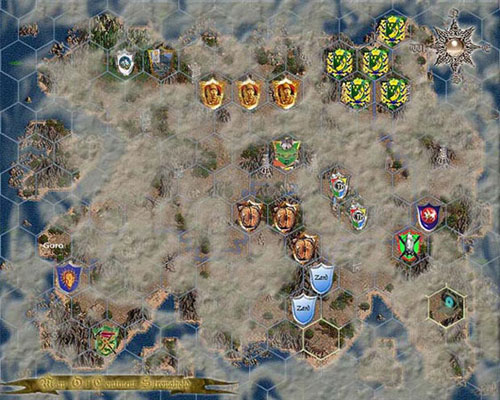
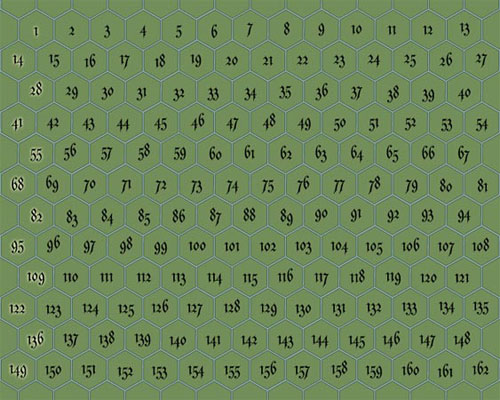


The feuds can have various colored borders on the map, as described below:
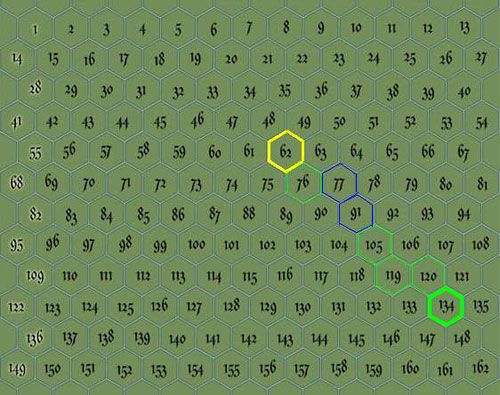
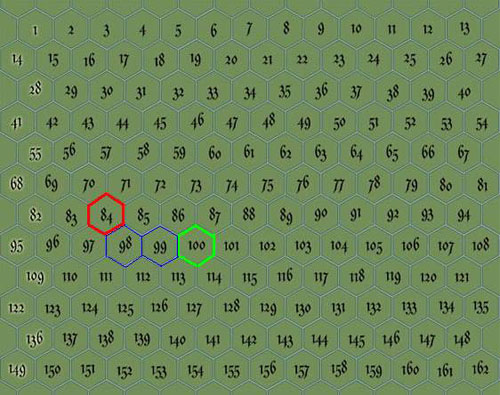
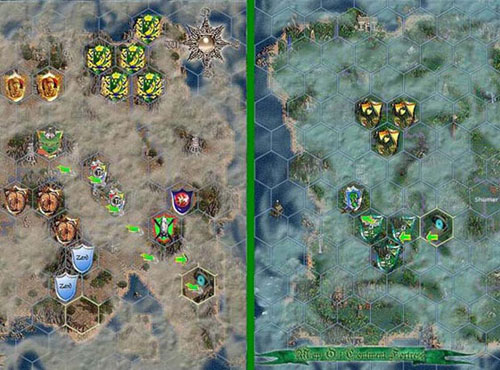
I, Sir Gorbik, challenge Sir Masterd to a duel in Heroes Lands 4. The reason is that the lizard spills my beer in the Tavern too often. My route to his feud goes through the following Lands: ĻĻ 76,77,91,105,119,120,134 Ė 100,99,98,84. Please note that these Lands are owned by the following Sirs: Ļ77, Ļ91 Ė Sir Kalex Ė here I go through the teleporter, getting to the teleporter Ļ100 at continent Fortress, Ė Ļ99, Ļ98 - Swamp Chaos
In case of an online duel, the route must start on an online feud and end on an online feud. The route may not start or end on a Magisterís feud (but can go through it). A special note for experts in pathfinding: donít pass the same hex twice!
Travelling costs for free lands:
Travelling through other feudalsí lands is 2.5 times more expensive. Blocked playersí lands are considered free when calculating the travelling costs.
Also, there is a bonus hex on the maps Ė the treasury, near the Supreme Magisterís citadel on the following continents:
Instead of paying for passing through this hex, you will get a bonus:
Upon taking the road fee from you, the Magister transfers @ to the feudal lords, whose lands you will be passing through. The road fee remains in the Magistracy only for the unclaimed lands.
Travelling through the lands of fellow clan members, vassals or suzerains is free
!!Attention!! There are following penalties:
If the challenged player accepts the challenge, he must send a confirmation letter to the Magistracy during the current duel round.
On getting the confirmation, the Magistracy opens the duel in the corresponding section of the "Heroes Lands" after the end of the current duel round. The opponents must download the starting save themselves.
During the first week after the duelís start, the participants may ask the Magistracy to change the starting save. Such a change is possible only after requests from both participants, and only once; it is made within three days after receiving the requests. The term of the duel is not prolonged in that case.
The Magistracy may deny a duel challenge without explaining the reasons. In this case, the duelists are informed by a letter from the Magistracy within three days.
The final (victorious) saves should be named with the nicknames of duel participants and sent to the Magistracy no later than the specified date (usually a month since the duel start) for examination of the results. Duel results are evaluated with priority of days. If the days are equal, the game score is compared. If both days and score are equal for both participants, a draw is announced.
If one of the duelists doesn't send his victorious save in time, he loses. If both players don't send their victorious saves, then they both lose. In the last case, each of them loses a feud in favour of the Magistracy. Bets on such duel wonít be returned.
By mutual consent of both duelists, the duel can be prolonged, but only once and for no longer than two weeks. In that case, the Magistracy informs the participants about the new deadline.
If one of the participants is unable to communicate with the Magistracy at the moment, the duel can be conventionally prolonged at request of the second participant. The Magistracy then sends a corresponding letter to both of them. If the first participant finds a way to get in touch with the Magistracy and send his final save before the initial deadline, but does not confirm the prolongation request by the second participant, then the latter one loses (if he does not send his save before the initial deadline). If the duel prolongation request is not denied by the first participant before the initial deadline, then the duel is prolonged by a single participantís request.
Duel winner gets a feud from the loser. Besides, he receives arroba equal to the amount of his game score. If the loser was the initiator of the duel, he pays a 100 @ fine in favour of the Magistracy. If both participants lose, they are fined too.
If the challenged player loses his last feud, then he has the right to demand a revenge duel. The opponent cannot refuse such a duel. But if a player initiates a duel himself and loses, he can't demand a revenge.
If the player who demanded a revenge loses again, he's pays 100 @ in favour of the Magistracy (as the challenger) and his opponent gets arroba equal to his score, obtained while playing the revenge duel. He doesn't get another feud.
If a duel ends in a draw, each of the participants gets arroba equal to half of their game score. The feuds remain with their owners.
If a player loses a duel, he has the right to ask the winner for explanation within one month after the official results of the duel were published. A copy of such request must be sent to the Magister. At this request, the winner is obliged to send his savegames to the loser (down to daily ones) along with all the necessary explanations. If this had not been done within a month, the loser may ask the Magister responsible for duels to cancel the duel results. All moot points of sending the savegames and possible punishment of the infringer are decided by the Magistracy.
All inhabitants of the Portal may bet on active duels.
Send your challenging letters to [email protected].
Stakes in wild duels are wild feuds, i.e. feuds won for and absolute first place in a Wild Land tourney on a special map. These feuds are not shown on the ordinary feud maps. Instead, they are placed on the Wild Lands map. Therefore, only those players having a wild feud have the right to participate in such duel.
Travelling costs in a wild duel are:
The route may go only through the known lands (i.e. cells with a finished map).
If you are isolated from your opponent, you may travel to his feud by means of teleportation, which costs 280@ in Heroes Lands 3 or 350@ in Heroes Lands 4.
Winning criteria in a wild duel are the starting heroís experience points and, in case of equal XP, the sum of his primary skills without any artifacts (like in Wild Lands tourneys).
In all other points, the rules of ordinary offline duels apply to the wild duels too.



